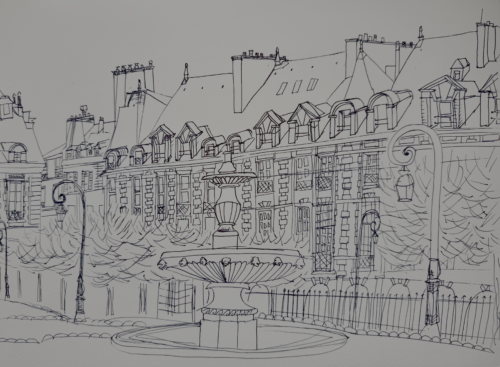Despite my love for Eliot Dining Hall, I spent much of sophomore fall hopping between different Houses’ dining halls—not for camaraderie, but for answers to Stat 110 p-sets. Each week, hours of my life disappeared in crowded office hours, hovering around a teaching fellow in hopes of getting a single question answered about probability, Bayes’s Theorem, or the Monty Hall problem. I lived in the library the week before the final. Without a doubt, Stat 110 was the greatest academic challenge I have faced in my life.
Thankfully, my pass/fail Paris schedule has proven much calmer. But last week, I felt a familiar pressure—one that rivaled those Stat 110 office hours. This time, though, I wasn’t in Quincy’s basement, but in a park on a sunny Wednesday morning. And it wasn’t an upcoming Information Theory midterm or forty-minute French presentation that elicited this feeling. It was a drawing. A drawing for my studio art class that, while graded, is purely for elective credit.
My grade didn’t hinge on how perfectly I captured Place des Vosges, a classic Parisian park, yet I internally felt a duty to something—myself, to the act of drawing, to the park itself—to render it just right. The stress mounted the moment I put pen to paper; without a pencil, there was no room for error. It peaked in the final fifteen minutes of class as I frantically added in the countless bricks of the buildings, my teacher and classmates watching, waiting to wrap up. A sense of relief washed over me as I set my pen down and held the drawing up to the view to admire my work.
That relief mirrored the feeling of walking out of a three-hour math final. And that shocked me. Why was drawing—something I’ve always found calming—suddenly causing me such stress? The short answer was perfectionism. But the real question, the more interesting one, was this: why do we see stress as something to avoid? These days we’re so focused on reducing stress that we might miss out on the good that comes from it. Researchers have found that certain levels of stress push us to achieve our optimal cognitive and behavioral performance. In these instances, stress makes us alert, and alertness makes us perform at our best. Maybe, the discomfort is worth the increased focus.
Yes, my chest tightened as I tried to perfect the angle of every line descending to the vanishing point in my drawing, but in exchange for a little discomfort, I was laser-focused for two and a half hours. Nothing else existed. I was stressed because I cared, and that care led to a finished product I was proud of. Sitting on that park bench, I gained a newfound respect for artists whose entire livelihoods depend on the precision and beauty of their work. And, in turn, my fantasy of dropping everything to become a painter in the French countryside diminished a little bit. I realized that in any path you choose, you can’t escape challenges and the stress that comes from them. When something matters to you or if you’re working towards something, there will always be some amount of stress that can motivate you or prove that you care. And that’s not necessarily a bad thing.
While my workload in Paris is lighter than at Harvard, I would by no means call it a stress-free time. I’ve swapped problem sets and tests for the challenges of language immersion and living abroad. Harvard tested me, and so has Paris—just in different ways. And from both, I’ve gained so much.
Thinking back to that Wednesday morning in the park, I remember how intensely I studied the fountain, the trees, and the buildings before me—obsessed with capturing every detail. But because of that, I truly saw my surroundings. Throughout the class, I had those moments of deep appreciation for being in Paris. My stress had manifested itself into both focus and gratitude—two things I’d gladly welcome more of in my life. I might not become a full-time artist, but I still plan to challenge myself creatively and embrace both the struggle and the satisfaction that comes with caring deeply about my work. I look back with different types of pride on my finished problem sets and artworks, but it’s hard to put one over the other.
When considering what you want to do in the future, the real question isn’t how to avoid stress, but what kind of stress is worth choosing. After graduation, you can take on the challenges of long hours in finance, the rigor of graduate school, or the uncertainty of starting your own business. At the right level, stress is motivation to do better, and it pushes us to achieve our dreams. No path is free of hardship, but stress can be a beautiful thing—a sign that something matters, a sign that you care. The real privilege is not avoiding sacrifice, but deciding what’s worth sacrificing for.
Frances Connors ’26 (maryfrancesconnors@college.harvard.edu) is crossing her fingers that the Painting Gen Ed lottery goes her way.

